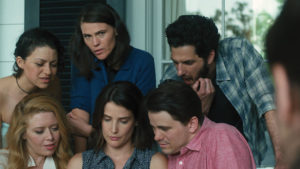 Missed Madison Film Festival
Missed Madison Film Festival
The Intervention | Clea DuVall | USA | 2016 | 88 minutes
Four Star | Madison Public Library | Amazon Video | Google Play
WUD Film member Vincent Mollica discusses at Clea Duvall’s The Intervention, whose ensemble cast delivers a smartly crafted and entertaining examination of modern relationships.
Despite a 20-year acting career, Clea DuVall marks her film debut with The Intervention, and she takes on the tasks of writing, directing and co-starring in the film. Her writing skills, though, come to the foreground in this small drama. With a smartly crafted script, the ensemble piece purposefully drives forward with dynamic character relationships but without any overwhelming tone.
Set almost entirely at a Georgia mansion owned by DuVall’s character, the film focuses on four couples. Three of the couples stage a “marriage intervention” for the fourth, an unhappily married couple (Cobie Smoulders and Vincent Piazza). All of them are friends, except a younger girlfriend played by Alia Shawkat. Besides all being affluent and white, the four couples share heavy baggage that reveals itself over the course of the visit.
These relationships are centered around Smoulders and Piazza’s marriage, but each one is given equal weight. Characters exist as people outside of their relationships, and the relationships impact each of them in different ways. Those characteristics don’t necessarily expand beyond, say, a young woman still interested in exploring sexually beyond the confines of a relationship. Despite that, the performers are each charismatic and funny enough to make even the lighter characters believable. Some performances rise above the rest. Smoulders, especially, brings a very real harsh temper. The result, then, is that you feel you are following different characters who don’t blend together.
The premise, and even some of the plot’s twists, suggest different directions the film could end up in: An improv-y hangout comedy, a dour emotional drama, an open doors farce. (A goofy exercising scene, a long monologue about a character’s dying wife, and a sequence built around one couple kissing another couple to provoke jealousy suggest these other directions.) However, the film’s usual mode is relatively flat. Rather than pitching any one kind of strong tone, the film is mostly filled with conversations of characters plotting or digging deeper into one another’s lives and relationships.
For a film filled with dialogue it does not feel laid back or lazy, but purposeful and driven. Several moments do not contain dialogue about plot or relationship, and rely on subtext laden comments or motions (like scenes with the occasional group hang-out, or with pairs silently sitting with one another). The subtext here is usually so strong, though, that the meaning of these actions is as clearly telegraphed as if the characters were simply just saying what they thought. The script smartly spends much of the film pairing characters off, or arranging smaller groups of four, rather than staging large group sequences, allowing these personal, revealing moments and conversations to occur.
This might not sound appealing, but DuVall carries out these modest ambitions in a satisfying way. A film that simply exposes you to the lives of likable people can be sufficiently appealing. The The Intervention might seem too bland due to the inoffensiveness its characters, but the film has an easy wavelength to tune in to. By the end, the film offers no great insight about relationships, but it’s very pleasurable to see believable characters be kind to each other. In this world, every problem has a solution, and every friend wants to help another friend. By focusing just on that, The Intervention provides good, modest, entertainment.
Check out the other Missed Madison Film Festival reviews for Friday, January 27:
Train to Busan reviewed by Erik Oliver at Madison Film Forum»
HyperNormalization reviewed by James Kreul at Madison Film Forum»
Editor’s Note: Vincent Mollica serves as the Starlight Associate Director at WUD Film. Starlight Cinema presents How to Tell You’re a Douchbag on February 2 at Union South Marquee Theatre.